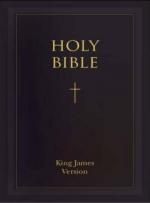|
|
King James Bible - Old Testament Topic Tracking: Women
Genesis
Women 1: Women occupy a precarious place in the Old Testament. Eve's eating from the Tree of Knowledge gave birth to centuries of religious-based misogyny. She was convinced by the serpent, a creature created by God. She corrupted her husband by giving him the fruit. This sort of relationship between women and sin is sustained throughout the Old Testament.
Women 2: In Egypt, Abram pretends that Sarah is his sister. He does this because he knows that the powerful Egyptians will have their way with her one way or another. This way, they won't kill him first. Because she cannot conceive, Sarah tells Abram to have sex with her maid Hagar and have children. It is important foremost that Abram have offspring not that Sarah does. Lot's wife is the one who looks back at Sodom and Gomorrah and turns to a pillar of salt. Jacob also has children with his wives' handmaidens. Fertility is of great importance to women in the Old Testament. Their greatest addition to their husband's wealth is a male heir.
Exodus
Women 3: Women often figure into the Ten Commandments and God's other orders to Moses. The law of adultery is specifically aimed at creating sexual exclusivity and clear lines of providing an heir to each man. The law forcing men to marry the women they sleep with provides social support for women. Without a man at this time, a woman and her child would starve.
Leviticus
Women 4: Laws concerning women are very prominent in this book. They are unclean during menstruation and after giving birth. A woman who is a whore and the child of a priest is to be put to death by burning. A woman's 'uncleanness' may be contracted during sexual intercourse and the man is considered unclean for seven subsequent days.
Numbers
Women 5: In the law, women are put in a precarious position. While they were given the benefit of inheritance in lieu of the fact hat many women were ending up in severe poverty as a result of deaths in their family, they do not have true legal autonomy. A woman's vow may be considered legal only if her husband supports it.
Deuteronomy
Women 6: More laws are given concerning women. These also mainly cover sexual transaction and exclusivity. A woman may be brought into the tribes from another if she mourns and converts. A woman may also marry again if she is divorced. If she has no child with her husband before he dies, she is to marry his brother. If a women is married to a man as a virgin and it turns out that she is not one, she may be stoned.
Judges
Women 7: Women continue to be a source of problems in Judges. Samson gets into trouble because of the women he loves; one of them betrays him. The tribe of Benjamin is alienated because they side with a people who allowed the rape of a traveler. The raped women was killed and cut into pieces by her wronged husband.
Ruth
Women 8: Originally, Israelites were commanded not to take wives from foreign tribes. When Naomi and her family move into Moab, her sons take foreign wives. Ruth, with the death of her husband, returns to Bethlehem and toils with the other women there. Boaz finds her acceptable and takes her as his wife. Her line bears the second king of Israel.
1 Kings
Women 9: The role of women continues to be difficult. The house of David is put into turmoil after the rape of Tamar. Both David and Solomon get themselves into trouble because of lust for women. Jezebel is the epitome of the evil women. She carries out her husband's evil deeds and secretly worships Baal. Jehosophat's mother also worships Baal.
Ezra
Women 10: Women must have fared badly in the exodus from their lands. They were taken into captivity. One of the things that Ezra sees as the worst transgression against God is intermarriage. In order for the people to be cleansed, Ezra demands that the Israelite men with foreign wives turn their women away. They do.
Esther
Women 11: The story of Esther presents two sides of the treatment of women. The first queen is deposed because she would not behave as the king wished. Esther is chosen as the new queen because she exhibits certain qualities that the king values. She used this position to get justice for her people when they are hunted. When the king gives her all the money from Haman's house, she gives it all to her father.
Job
Women 12: Women are only briefly present in the book of Job but their absence is important. The only action taken by a woman in this book is by Job's wife. She tells him to curse God and stop living when he has lost everything. Not only does she not share in Job's immeasurable faith, she also does not comfort him or speak with him in the way his male friends do.
Isaiah
Women 13: Though tersely mentioned, women are objects of sins or sinners. On the day of judgement, women who are not of the tribes of Israel would be turned away. Women are specifically chastised for owning jewelry and fine goods because the children of Israel are collectively warned not to value possessions too much.
Lamentations
Women 14: Increasingly, in the prophetic works, women become the comparative part of metaphor and simile Israel has been a harlot, she is like a women who has been treacherous to her husband. In the words of the prophets, Israel's covenant is like a marriage agreement. By worshiping other gods, the people have engaged in congress outside of the marriage. In Jeremiah's Lamentations, the women is not even married, she is just filthy.




